仁爱版九年级下册英语重点知识点梳理
九年级下仁爱英语知识点
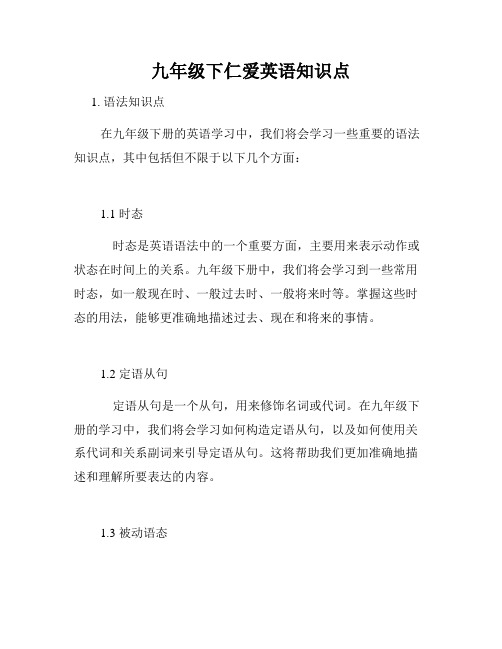
九年级下仁爱英语知识点1. 语法知识点在九年级下册的英语学习中,我们将会学习一些重要的语法知识点,其中包括但不限于以下几个方面:1.1 时态时态是英语语法中的一个重要方面,主要用来表示动作或状态在时间上的关系。
九年级下册中,我们将会学习到一些常用时态,如一般现在时、一般过去时、一般将来时等。
掌握这些时态的用法,能够更准确地描述过去、现在和将来的事情。
1.2 定语从句定语从句是一个从句,用来修饰名词或代词。
在九年级下册的学习中,我们将会学习如何构造定语从句,以及如何使用关系代词和关系副词来引导定语从句。
这将帮助我们更加准确地描述和理解所要表达的内容。
1.3 被动语态被动语态用于强调动作的承受者或者强调动作本身。
在九年级下册中,我们将会学习如何构造被动语态,以及如何正确使用助动词和被动形式的及物动词。
掌握被动语态的用法,能够使我们的表达更加灵活和准确。
1.4 条件句条件句用于表示某个条件下的结果。
在九年级下册中,我们将会学习到不同类型的条件句,如零条件句、一般条件句、虚拟条件句等。
学会运用条件句,能够帮助我们更好地表达假设、愿望、建议等内容。
2. 词汇知识点九年级下册英语学习中,我们将会学习到一些重要的词汇知识点,这些词汇会帮助我们更准确地理解和表达所学的内容。
2.1 同义词与反义词同义词和反义词是词汇中常见的两个概念。
掌握同义词和反义词的用法,能够帮助我们在表达时选择更加准确和恰当的词汇。
2.2 词根与词缀在九年级下册的学习中,我们将会学习到一些常见的词根和词缀。
了解这些词根和词缀的含义和用法,可以帮助我们更好地理解和记忆词汇。
2.3 固定搭配在英语中,有许多词语常常搭配使用,它们的意思往往不能从各个单词的意义推测出来。
在九年级下册的学习中,我们将会学习到一些常见的固定搭配,掌握这些固定搭配,能够使我们的表达更加地道和自然。
3. 阅读技巧在九年级下册英语学习中,我们将会接触到一些文本材料,如短文、文章等。
仁爱英语九年级下 全册 重点短语、重点句型、难点辨析,语法详解
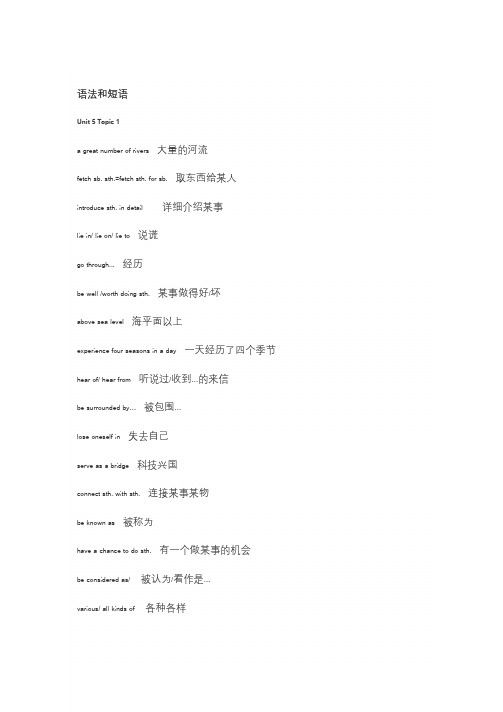
语法和短语Unit 5 Topic 1a great number of rivers 大量的河流fetch sb. sth.=fetch sth. for sb. 取东西给某人introduce sth. in detail 详细介绍某事lie in/ lie on/ lie to 说谎go through... 经历be well /worth doing sth. 某事做得好/坏above sea level 海平面以上experience four seasons in a day 一天经历了四个季节hear of/ hear from 听说过/收到…的来信be surrounded by…被包围…lose oneself in 失去自己serve as a bridge 科技兴国connect sth. with sth. 连接某事某物be known as 被称为have a chance to do sth. 有一个做某事的机会be considered as/ 被认为/看作是…various/ all kinds of 各种各样protect against …保护…be covered with 覆盖Topic 2in the field of education 在教育的领域上receive/get/have a good education 接受/得到一个良好的教育at the age of 55 在55岁search for…搜索in one’s thirties 在某人30岁的时候pass away/die 去世come to an end 结束be proud of/be the pride of/take pride in 以…为豪die of illness 死于疾病in total 总和take an active part in…积极参与…be/become popular with…成为流行…bring down the Qing dynasty 推翻清朝break down from hard work 积劳成疾full of regret 充满遗憾face the danger of…面临的危险wipe out 消灭in my spare/free time 在我的业余时间win a prize 得奖would rather do sth. than do sth./prefer to do sth. rather than do sth. 宁愿做某事而不愿做某事/宁愿做某事而不愿做另一件事fall in love with…爱上…in a tired voice 用疲惫的声音in surprise/surprisingly 在吃惊be ready to help others 乐于助人what’s more 更重要的是pay attention to details 注意细节once upon a time/long long ago 从前/很久很久以前be angry at sth./be angry with sb. 对某事生气。
仁爱英语九年级下册知识点归纳总结(话题版)
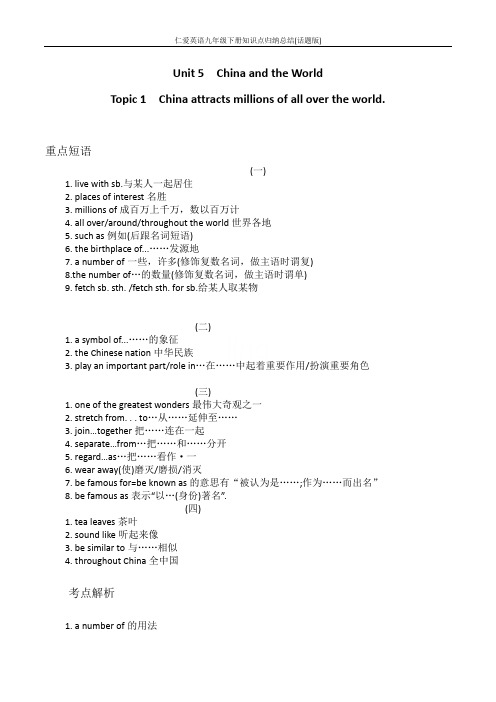
Unit 5 China and the WorldTopic 1 China attracts millions of all over the world.重点短语(一)1. live with sb.与某人一起居住2. places of interest名胜3. millions of成百万上千万,数以百万计4. all over/around/throughout the world世界各地5. such as例如(后跟名词短语)6. the birthplace of...……发源地7. a number of一些,许多(修饰复数名词,做主语时谓复)8.the number of…的数量(修饰复数名词,做主语时谓单)9. fetch sb. sth. /fetch sth. for sb.给某人取某物(二)1. a symbol of...……的象征2. the Chinese nation中华民族3. play an important part/role in…在……中起着重要作用/扮演重要角色(三)1. one of the greatest wonders最伟大奇观之一2. stretch from. . . to…从……延伸至……3. join…together把……连在一起4. separate…from…把……和……分开5. regard…as…把……看作·一6. wear away(使)磨灭/磨损/消灭7. be famous for=be known as的意思有“被认为是……;作为……而出名”8. be famous as表示“以…(身份)著名”.(四)1. tea leaves茶叶2. sound like听起来像3. be similar to与……相似4. throughout China全中国考点解析1. a number of的用法a number of意思是“许多……”,后接复数名词,谓语通常用复数:A number of students were absent from the meeting.许多学生没有到会。
英语仁爱九年级下册知识点
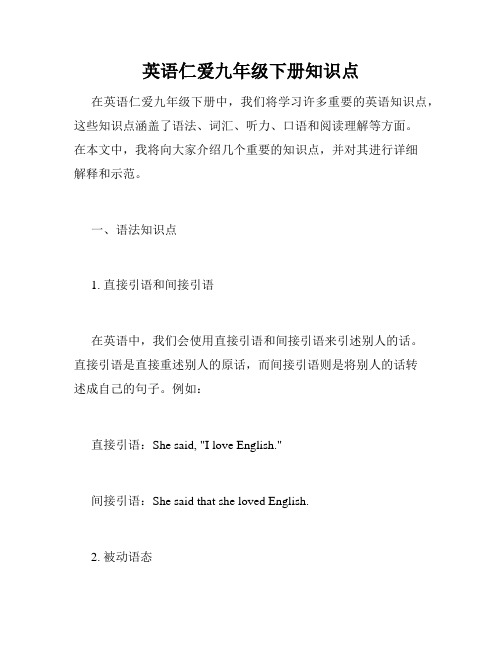
英语仁爱九年级下册知识点在英语仁爱九年级下册中,我们将学习许多重要的英语知识点,这些知识点涵盖了语法、词汇、听力、口语和阅读理解等方面。
在本文中,我将向大家介绍几个重要的知识点,并对其进行详细解释和示范。
一、语法知识点1. 直接引语和间接引语在英语中,我们会使用直接引语和间接引语来引述别人的话。
直接引语是直接重述别人的原话,而间接引语则是将别人的话转述成自己的句子。
例如:直接引语:She said, "I love English."间接引语:She said that she loved English.2. 被动语态被动语态用于强调动作的承受者而不是执行者。
被动语态的构成是:助动词be + 过去分词。
例如:主动语态:Tom grows flowers in his garden.被动语态:Flowers are grown in Tom's garden.二、词汇知识点1. 同义词同义词是指意思相近或相同的词语。
通过学习同义词,我们可以更加丰富自己的词汇量,提高表达的准确性。
例如:happy - gladbeautiful - attractivebig - large2. 反义词反义词是指意思相反的词语。
学习反义词能够帮助我们更好地理解和运用单词。
例如:good - badhot - coldstart - stop三、听力和口语知识点1. 听力技巧在英语听力中,我们需要注意一些技巧来提高听力理解能力。
首先,要多听多练,提高对不同语速和口音的适应能力;其次,可以通过听英语歌曲、看英语电影等方式来提升听力水平;最后,要注意细节信息,如听清关键词和重要细节。
2. 口语表达口语是用于交流和表达的重要技能。
在口语表达中,要注意语音语调的准确运用,流利的句子结构和正确的词汇选择。
此外,多进行口语练习,与他人进行对话,参加英语角或英语演讲比赛等都是提高口语表达能力的有效途径。
仁爱英语九下知识点归纳
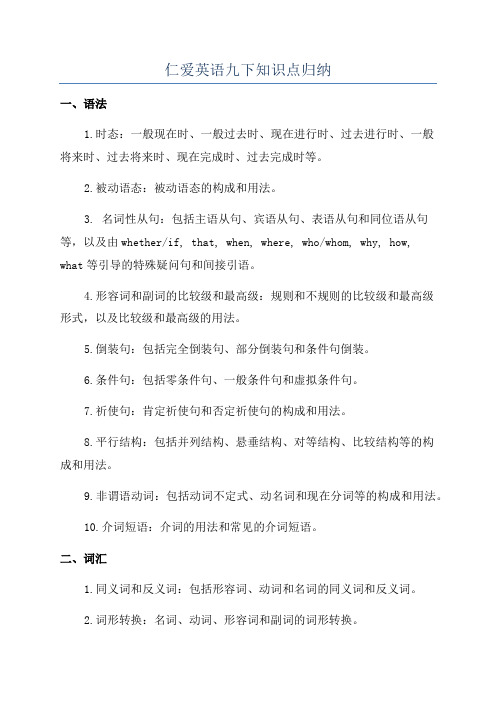
仁爱英语九下知识点归纳一、语法1.时态:一般现在时、一般过去时、现在进行时、过去进行时、一般将来时、过去将来时、现在完成时、过去完成时等。
2.被动语态:被动语态的构成和用法。
3. 名词性从句:包括主语从句、宾语从句、表语从句和同位语从句等,以及由whether/if, that, when, where, who/whom, why, how,what等引导的特殊疑问句和间接引语。
4.形容词和副词的比较级和最高级:规则和不规则的比较级和最高级形式,以及比较级和最高级的用法。
5.倒装句:包括完全倒装句、部分倒装句和条件句倒装。
6.条件句:包括零条件句、一般条件句和虚拟条件句。
7.祈使句:肯定祈使句和否定祈使句的构成和用法。
8.平行结构:包括并列结构、悬垂结构、对等结构、比较结构等的构成和用法。
9.非谓语动词:包括动词不定式、动名词和现在分词等的构成和用法。
10.介词短语:介词的用法和常见的介词短语。
二、词汇1.同义词和反义词:包括形容词、动词和名词的同义词和反义词。
2.词形转换:名词、动词、形容词和副词的词形转换。
3.词组和固定搭配:包括常见的动词短语、介词短语和固定搭配。
4.拓展词汇:通过课文和阅读中的生词来拓展词汇量。
三、阅读理解1.阅读技巧:包括快速阅读、略读和精读等阅读技巧。
2.阅读目的:阅读目的与方法、阅读态度等。
3.推理判断:根据文中的线索进行推理判断。
4.阅读策略:在阅读过程中合理运用策略,如概括大意、寻找关键信息等。
5.阅读材料:包括新闻报道、广告、说明文、记叙文、演讲稿等。
四、写作技巧1.写作结构:包括写作的开头、主体和结尾。
2.写作方法:写作时的选择和组织材料的方法。
3.写作技巧:包括描述、演绎、引用、对比、举例、定义、归纳、递进等写作技巧。
4.书信写作:包括给朋友写信、给老师写信、给亲人写信等。
5.口头表达:包括认为、喜欢、想法、建议和目的等一般句型的用法。
五、其他知识点1.国际音标:了解国际音标的符号和发音。
仁爱版九年级英语下册知识点汇总

仁爱版九年级英语下册知识点汇总Unit 1: Friends- Vocabulary: Words related to friendship and personality traits- Reading: Reading passages about friendship and relationships- Listening: Listening to dialogues and conversations about friends Unit 2: Hobbies- Vocabulary: Words related to hobbies and leisure activities- Grammar: Using the present perfect tense to talk about experiences- Reading: Reading texts about different hobbies and interests- Listening: Listening to people discussing their hobbiesUnit 3: Environment- Vocabulary: Words related to the environment and environmental issues- Grammar: Using modals to express possibility and obligation- Reading: Reading articles about environmental problems and solutions- Listening: Listening to discussions about ways to protect the environmentUnit 4: Health- Vocabulary: Words related to health and healthy lifestyle- Grammar: Using should and shouldn't to give advice- Reading: Reading passages about healthy habits and diseases- Listening: Listening to conversations about health and wellbeingUnit 5: Jobs- Vocabulary: Words related to different professions- Grammar: Using the simple present tense to talk about habitual actions- Reading: Reading texts about various types of jobs- Listening: Listening to interviews and discussions about career choicesUnit 6: Technology- Vocabulary: Words related to technology and electronic devices - Grammar: Using the present continuous tense to talk about future plans- Reading: Reading articles about the impact of technology on society- Listening: Listening to talks and discussions about technological advancementsUnit 7: Travel- Vocabulary: Words related to travel and tourism- Grammar: Using the past simple tense to talk about past events- Reading: Reading passages about different travel destinations and experiences- Listening: Listening to travel stories and conversations about vacationsUnit 8: Dreams- Vocabulary: Words related to dreams and ambitions- Grammar: Using the future tense to talk about future plans and aspirations- Reading: Reading texts about people's dreams and goals- Listening: Listening to people sharing their hopes and dreamsUnit 9: Review- Revision of vocabulary and grammar from previous units- Practicing all language skills: reading, writing, listening, and speaking以上是仁爱版九年级英语下册的知识点汇总。
仁爱英语九下知识点归纳
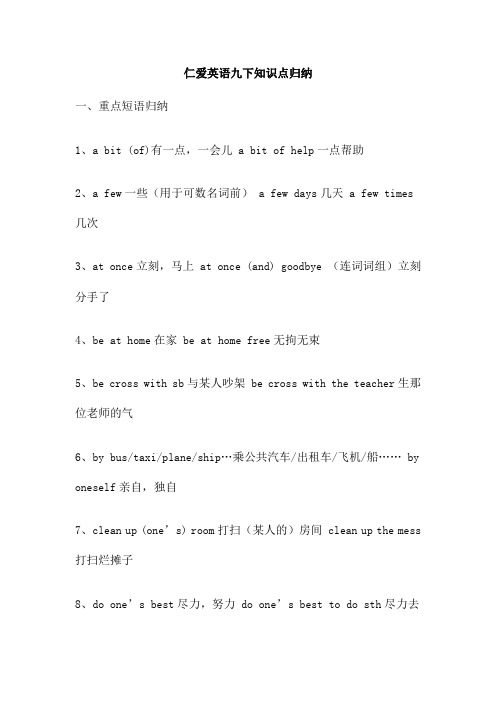
仁爱英语九下知识点归纳一、重点短语归纳1、a bit (of)有一点,一会儿 a bit of help一点帮助2、a few一些(用于可数名词前) a few days几天 a few times 几次3、at once立刻,马上 at once (and) goodbye (连词词组)立刻分手了4、be at home在家 be at home free无拘无束5、be cross with sb与某人吵架 be cross with the teacher生那位老师的气6、by bus/taxi/plane/ship…乘公共汽车/出租车/飞机/船…… by oneself亲自,独自7、clean up (one’s) room打扫(某人的)房间 clean up the mess 打扫烂摊子8、do one’s best尽力,努力 do one’s best to do sth尽力去做某事9、get on (with sb) (与某人)相处 get on well with sb与某人相处得好 get on well with one’s work工作进展顺利10、get to the station到车站 get to the airport到机场 get to the head of the queue到队头 get to know sb认识某人11、give sb a hand帮助某人 give sb a hand with sth帮助某人做某事 give sb a hand in doing sth帮助某人做某事 give sb a call 给某人打 give one’s regards to sb向某人问候 give sb a ring 给某人打 give sb a message给某人留言 give the message to sb 给某人留言12、have a good time (doing sth)玩得高兴,过得愉快 have a good time (in) doing sth做某事玩得高兴、过得愉快 have a good time with sb和某人一起玩得高兴 have a good time at home在家过得愉快 have a good time at work在工作上过得愉快 have a good time on one’s own自己过得愉快13、help oneself to请自便 help oneself to sth请自便吃某菜 help (to) do sth帮助做某事 help sb (to) do sth帮助某人做某事 helpsb with sth帮助某人做某事 help oneself to do sth请自便做某事 help oneself with sth请自便用某物 help with one’s work 帮助工作 help with one’s homework帮助做家庭作业 help to clean up the classroom帮忙打扫教室 help to clean up the sitting-room 帮忙打扫客厅14、keep healthy/fit保持健康 keep healthy/fit by doing sth 通过做某事保持健康 keep healthy/fit on one’s own自己保持健康 keep fit in every way通过各种方法保持健康 keep fit and strong保持健康强壮 keep healthy/fit through exercise通过锻炼保持健康 keep healthy/fit through good eating habits通过良好的饮食习惯保持健康 keep healthy/fit by going to see a doctor通过看医生保持健康15、like this这样(指前面所述内容) like this, like that这样那样(分别) like this and that这样那样(交替) like this kind of thing这样一类东西 like this sort of thing这样一类的东西 like this, that and the other这样那样都来点 like this and that in turn这样那样交替进行16、make one’s way to…前往…… make one’s way through…穿过……,在……中前进 make one’s way home回家 make one’s way to the nearest crossing走到最近的十字路口 make one’s way to the station到车站去 make one’s way to the classroom到教室去 make one’s way through the crowd在人群中前进 make one’s way through the traffic在车流中前进17、not at all别客气,没什么 not at all (用于回答感谢,用在正式场合)不用谢,没什么 not at all (用于回答道歉,意为一点也不介意)没关系,一点也不 not at all (用于表示否定意义或委婉谢绝)决不,一点也不 not at all (用于表示轻蔑、不耐烦等)得了,得了,别胡扯了! not at all (用于表示不在乎、一无所知等)没关系,一点也不 not at all (用于强调程度)非常 not at all (用于加强语气)完全地,彻底地 not at all you are welcome不客气(回答感谢用语) you are welcome不客气(回答道歉用语) welcome 是 you are welcome的缩写形式。
英语仁爱九年级下册知识点
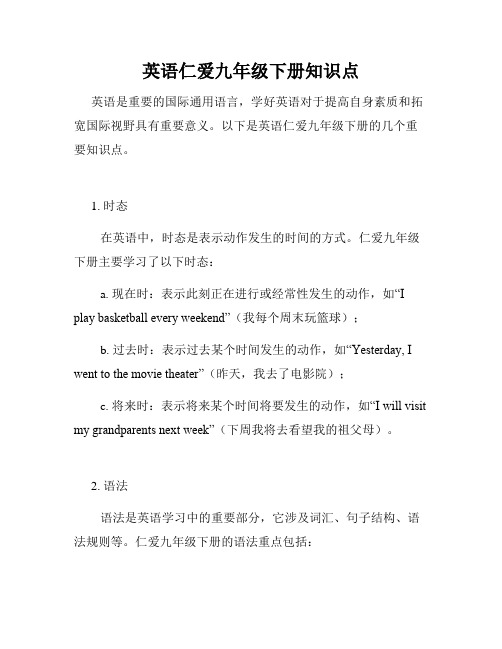
英语仁爱九年级下册知识点英语是重要的国际通用语言,学好英语对于提高自身素质和拓宽国际视野具有重要意义。
以下是英语仁爱九年级下册的几个重要知识点。
1. 时态在英语中,时态是表示动作发生的时间的方式。
仁爱九年级下册主要学习了以下时态:a. 现在时:表示此刻正在进行或经常性发生的动作,如“I play basketball every weekend”(我每个周末玩篮球);b. 过去时:表示过去某个时间发生的动作,如“Yesterday, I went to the movie theater”(昨天,我去了电影院);c. 将来时:表示将来某个时间将要发生的动作,如“I will visit my grandparents next week”(下周我将去看望我的祖父母)。
2. 语法语法是英语学习中的重要部分,它涉及词汇、句子结构、语法规则等。
仁爱九年级下册的语法重点包括:a. 直接引语和间接引语:直接引语是原话的直接表达,间接引语是通过转述或概括表达原话的内容,如“He said, 'I am tired'”(他说:“我很累”)可以改写为“He said that he was tired”(他说他很累);b. 从句:从句是一个句子部分,不能独立成句,分为主从句。
常见的从句有名词性从句、定语从句和状语从句,如“I know why he is angry”(我知道他为什么生气)。
3. 词汇词汇是语言的基础,扩充词汇量是提高英语水平的关键。
仁爱九年级下册的词汇知识包括:a. 单词拼写:通过拼写训练提高对单词的记忆和应用能力;b. 同义词和反义词:学习一些常见的同义词和反义词,丰富表达方式,如“happy”(高兴)和“glad”(快乐);c. 词组和短语:了解常用的固定词组和短语,如“give up”(放弃)、“take care of”(照顾)等。
4. 阅读理解阅读理解是提高语言综合运用能力的重要训练。
- 1、下载文档前请自行甄别文档内容的完整性,平台不提供额外的编辑、内容补充、找答案等附加服务。
- 2、"仅部分预览"的文档,不可在线预览部分如存在完整性等问题,可反馈申请退款(可完整预览的文档不适用该条件!)。
- 3、如文档侵犯您的权益,请联系客服反馈,我们会尽快为您处理(人工客服工作时间:9:00-18:30)。
仁爱版| 九年级下册英语重点知识点梳理Unit5 Topic1【重点短语】1. know little about 对……几乎不了解Know more / a little / nothing about…2. place(s) of interest 名胜古迹3. the birthplace of Chinese culture 中华文化的发源地4. attract millions of tourists 吸引了成百万的游客5. a great number of 许多the number of …的数目6. the second longest river 第二长河7. fetch sb. sth. = fetch sth. for sb. 为某人取某物8. introduce …in detail 详细地介绍……introduce A to B 把A 介绍给Bintroduce oneself 自我介绍9. lie in 位于……内10. run / go through…流经/ 途经……11. be well worth doing sth. 很值得做某事12. regard…as…把……看成…..be regarded as …被当作…13. a symbol of imperial power 帝王权利的象征14.carve sth. on the stone 把…刻在石头上15.guard the whole nation 守卫整个民族16.play an important part / role in 在…发挥重要作用17.be made of white marble 由白色的大理石制成18.stretch from …..to…从…. 延伸到….19.be made of packed earth and wood 由成袋的泥土和木头制成be made of stone and brick 由石头和砖块制成20.bring tourists into China 把游客带入中国21.a treasure of Chinese civilization 中华民族的瑰宝22.join…together …. 把…连接在一起23.wear away (wore away, have / has worn away )磨损24.separate …. from …把…从…分开25. be famous for 因…而著名be famous as …be known as …. 作为….而出名26.an important Chinese export 一项很重要的中国出口产品27.sound similar to 听起来和…很相像28.the mild climate 温和的气候29. rich soil 肥沃的土地30.develop unique tea culture 发展独一无二的茶文化【词形转换】1. attract (v.) 吸引---attraction (名词)-- attractive (adj.) 吸引人的2. tour ---tourist (名词) 游客3. introduce (动词)--introduction(名词)4.long ( adj. )--- length ( n. )5. high( adj.) –height ( n.)6. wear ---- wore ---- worn7 enemy -- enemies8. responsible ---- responsibility【重点句型】1. It is / has been ……since ….. 自从…以来已经多久了2. And many of them are famous, such as Mount Song, Mount Huang and Mount Emei.它们当中许多很有名,比如嵩山、恒山和峨眉山。
3. Among them, the Changjiang River is the longest one and the second longest one is the Yellow River.它们当中长江是最长的一条,第二长的是黄河。
4. What grand buildings!多么壮丽的建筑物啊!5. It’s said that ….. 据说…6. It’s a mountain with lots of strange pine trees. 它是一座长着很多奇松的山7.It stretches from Shanghaiguan in the east to Jiayuguan in the west . 它从东部山海关一直延伸到西部嘉峪关8.The first emperor ,QinShihuang, joined all these smaller walls together to make the Great Wall.第一个皇帝秦始皇将所有小城墙连接起来成了长城。
9. These early walls that were made of packed earth and wood wore away in the rain and wind.由成袋的泥土和木头制成的早期城墙在风雨中磨损了。
10.The Great Wall was first built by ancient people to separate them from their enemies.起初建筑长城是为了将人们和敌人分离开。
11. The Great Wall is a treasure of Chinese civilization and it is regarded as a symbol of the Chinese nation.长城是中华文明的瑰宝和中华民族的象征。
【重要知识点】1. If you want to learn more, I can fetch you Guide to China.如果你想了解更多,我可以给你拿一本《中国指南》fetch = go somewhere and bring sth./ sb. back 到别处去取回或把人请来fetch sb. sth.= fetch sth. for sb. 为某人取某物eg. Could you fetch me some chalk? = Could you fetch some chalk for me?Have you fetched the doctor?bring指从别处把某人(物)带来(拿来)。
take指拿去;带去”。
与bring相反。
fetch指到别处去取回或把人请来。
carry 指搬动较重的物体,无方向性。
eg. Bring me today’s newspaper, please. 请帮我把今天的报纸拿来。
Take this book to my office. 把这本书拿到我的办公室去。
Please fetch a doctor for Lao Li. 请为老李请一位医生来。
Students often help the old man carry water. 学生们经常帮那位老人提水。
2. It (The Yellow River) is the second longest river in China.它(黄河)是中国的第二长河。
“the +序数词+形容词最高级+可数名词单数”,表示“第几……的”。
如:I think computer is the first most useful tool of all.我想电脑是所有工具中最有用的。
The second most important thing is to come here by yourself. 第二重要的事是你自己来到这儿。
3. It goes through nine provinces and finally joins the Bohai Sea. 它流经九个省份,最终汇入渤海湾。
go through “穿过;通过”,指通过两边,相当于一条直线go across “穿过;横穿”,指从这边到那边,相当于一条线段eg. go through the street (竖)穿过街道go across the street = cross the street (横)过马路4. be known/famous as…“作为……而出名”be known/famous for…“因……而出名”be known to…“为……所熟知”eg. Yao Ming is known/famous as a basketball player.姚明作为一名蓝球运动员而出名.West Lake is known/famous for its beautiful scenery.西湖因秀丽的景色而出名.Beijing is known to all the people in the world because of the 2008 Olympic Games.北京因为2008年奥运会而为全世界人民所熟知.【重点语法】定语从句在复合句中,修饰某一名词或代词的从句。
而被修饰的名词或代词被称为先行词。
定语从句放在先行词的后面,由关系代词或关系副词引导。
常见的关系代词有:that 指代“人或物”which 指代“物”who/ whom 指代“人”whose 指代“某人的”关系代词在从句作主语或宾语; whose作定语。
作宾语时关系代词可省略。
本话题中出现以下定语从句:China is a big country that has about 5,000 years of history.中国是一个拥有约五千年历史的大国。
That’s all (that) I know. 那是我所知道的全部。
It’s a book which introduces China in detail. 它是一本详细介绍中国的书。
It’s Mount Tai that/ which lies in Shandong Province.它是位于山东省境内的泰山。
That’s the most fantastic place (that) I have ever heard of.那是我曾听说过的最神奇的地方。
West Lake which lies in Hangzhou is one of the most famous lakes in China.位于杭州市的西湖是中国最著名的湖泊之一。
